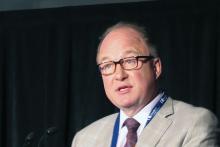CHICAGO – Adding isatuximab, an anti-CD38 monoclonal antibody, to pomalidomide and dexamethasone can prolong progression-free survival (PFS) in patients with relapsed/refractory multiple myeloma, a phase 3 trial suggests.
The median PFS was 11.53 months among patients who received isatuximab (isa) plus pomalidomide and dexamethasone (Pd), compared with 6.47 months in patients who received Pd alone (P = .001).
“[W]e now have the first randomized, phase 3 study demonstrating a significant prolonged PFS benefit of CD38 targeting combined with pomalidomide and dexamethasone in relapsed/refractory myeloma,” said Paul Richardson, MD, of the Dana-Farber Cancer Institute in Boston.
“The PFS was the longest observed in this population to date ..., and ... this PFS benefit was consistent among subgroups.”
Dr. Richardson presented these results from the ICARIA-MM trial at the annual meeting of the American Society of Clinical Oncology.
Researchers enrolled 307 patients with relapsed/refractory multiple myeloma. The patients had a median age of 67 years (range, 36-86 years) and a median time from diagnosis of 4.23 years (range, 0.5-20.5 years).
The patients had received a median of three prior therapies (range, 2-11 for the isa-Pd arm and 2-10 for the Pd arm). All patients had previously received a proteasome inhibitor and an immunomodulatory agent.
The patients received isatuximab at 10 mg/kg on days 1, 8, 15, and 22 in cycle 1, then on days 1 and 15 for subsequent cycles. Pomalidomide and dexamethasone were given at standard doses in both treatment arms.
At a median follow-up of 11.6 months, 42.2% of patients were still receiving isa-Pd, and 22.9% of patients were still on Pd alone. The most common reason for stopping either treatment was disease progression (42.9% in the isa-Pd arm and 57.5% in the Pd arm).
Efficacy
The overall response rate was 60.4% in the isa-Pd arm and 35.3% in the Pd arm (P less than .0001). The rates of complete response/stringent complete response were 4.5% and 2.0%, respectively. The rates of minimal residual disease negativity were 5.2% and 0%, respectively.
The median time to next treatment was 9.1 months in the Pd arm and was not reached in the isa-Pd arm (hazard ratio, 0.538).
The median PFS was 11.53 months in the isa-Pd arm and 6.47 months in the Pd arm (HR, 0.596; P = .001). There was a PFS benefit with isa-Pd across subgroups, including in patients with renal dysfunction, those with high-risk cytogenetics, and patients who were refractory to lenalidomide.
The median overall survival was not reached in either treatment arm. The overall survival rate was 72% in the isa-Pd arm and 63% in the Pd arm (HR, 0.687).
Safety
There were more grade 3 or higher treatment-emergent adverse events (TEAEs) with isa-Pd. However, as Dr. Richardson noted, adding isa to Pd did not increase the rates of TEAEs leading to treatment discontinuation or death.
The incidence of grade 3 or higher TEAEs was 86.8% in the isa-Pd arm and 70.5% in the Pd arm. The rate of serious TEAEs was 61.8% and 53.7%, respectively.
TEAEs leading to treatment discontinuation occurred in 7.2% of patients in the isa-Pd arm and 12.8% in the Pd arm. TEAEs leading to death occurred in 7.9% and 9.4%, respectively.
Grade 3 TEAEs (in the isa-Pd and Pd arms, respectively) included upper respiratory tract infection (3.3% and 0.7%), diarrhea (2.0% and 0.7%), bronchitis (3.3% and 0.7%), pneumonia (15.1% and 13.4%), fatigue (3.9% and 0%), back pain (2.0% and 1.3%), asthenia (3.3% and 2.7%), and dyspnea (3.9% and 1.3%).
The only grade 4 TEAE was pneumonia (1.3% in both arms).
Based on the safety and efficacy results, Dr. Richardson concluded that isa-Pd “is an important new treatment option for our patients with relapsed/refractory myeloma.”
This study was funded by Sanofi. Dr. Richardson reported financial relationships with Celgene, Janssen, and Takeda. His coinvestigators reported relationships with a range of companies.
SOURCE: Richardson P et al. ASCO 2019, Abstract 8004.


